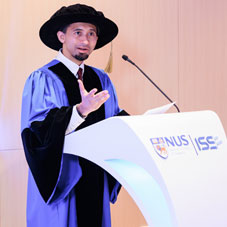
Shamir Rahim
Co-Founder
In the dynamic realm of technology, exceptional leadership is the catalyst that propels a company from concept to industry leader. Visionaries in this field don’t just navigate change—they drive it, setting new standards and crafting groundbreaking solutions. Shamir Rahim embodies this brand of leadership with a compelling narrative. A molecular biologist by training and a self-taught web developer by passion, Shamir transitioned from the world of stem cell research and pharma to the forefront of tech innovation. His brainchild, Gotsurge, launched amid pandemic disruptions, swiftly pivoted to marine logistics, and was acquired by Yinson Green Technologies within 18 months. With accolades like Outstanding Young Alumni from NUS and Young Professional of the Year from Supply Chain Asia, Shamir is a testament to how visionary leadership can turn bold ideas into transformative success. Let’s read on.
How do you view the evolving technology trends in the sector, and how would you characterize their impact on your organization?
The pace of technological change certainly feels faster, and I say this as someone who grew up using dial-up modems and creating new websites every other week. At Gotsurge, now part of a much larger parent organization, while I still run experiments with the same speed, our approach to adopting new technology is more calibrated and thoughtful. As a business, we always begin by clarifying the problem statement, going back to first principles to solve it. Technology is often the solution, but we must first understand the question. As tech executives, it's crucial to avoid getting captivated by the latest shiny object—business needs must always come first, and not every problem requires AI.
Could you describe your leadership approach and the key principles or methodologies you follow as a leader?
I might be an idealist, but I believe in the concept of the reluctant leader. Leadership doesn’t require a title, and often the most influential leaders are those who operate invisibly. Lao Tzu expressed this beautifully: true leadership is when followers say, "we did it ourselves" once the goal is achieved. In today’s social media-driven world, recognition is often mistaken for the end goal, though I acknowledge the irony of stating this.
Leadership doesn’t require a title, and often the most influential leaders are those who operate invisibly
In the day-to-day running of the business, particularly when guiding new managers, I often reference John Maxwell’s five levels of leadership. This framework is a valuable tool for assessing our position with our teams, emphasizing that 'position' is the lowest level of leadership—a mere starting point. Leadership isn’t a destination but a skill that requires continuous practice. Everyone should strive to lead, even without a formal title.
How do you stay informed about current industry trends to guide your organization toward the future?
I have a deep love for reading, not just business books and tech articles, but also scientific papers and technical textbooks. However, reading alone isn’t always enough—gaining a deep understanding of new breakthroughs often requires hands-on experience. Fortunately, this is relatively easy in the digital tech space, especially with the availability of modern IDEs and automated install packages. I’m also actively involved in R&D, from supervising undergraduate interns and Masters research projects to co-pitching for R&D grants and co-authoring papers with university faculty.
I consider myself a perpetual student, and in fact, I'm back in school pursuing an industrial PhD. I believe that intellectual curiosity keeps one humble and open to continuous learning, and it’s something that should be nurtured in whatever form it takes.
What were the key challenges you faced when first establishing yourself as a successful leader, and how did you overcome them to achieve professional success?
It might sound trivial, but my youthful appearance has been a challenge. Initially, and even now, I often have to work harder to be taken seriously, particularly by executives from the 'boomer' generation. They may perceive 'young upstarts' like me, especially as a tech startup founder, as a potential threat. To address this, I make a conscious effort to build relationships and create rapport, reassuring them that AI, technology, and I are not here to replace them. This will likely remain an ongoing effort for me—wish me luck!
What is the future direction you are aiming for?
Business-wise, I’m as enthusiastic as I was on Day 1 when we founded Gotsurge, eager to digitally transform a new industry sector—today, maritime logistics in the region. For my team, I’m excited to explore new AI technologies to automate our processes, drive innovation, and create impactful solutions for businesses. Personally, my focus is on successfully completing my PhD and applying the insights I gain in a meaningful way to my work.
Shamir Rahim, Co-Founder, Gotsurge
Shamir Rahim is a technopreneur driven by a deep enthusiasm for artificial intelligence and internet technologies. He co-founded Gotsurge, which was acquired by Yinson Green Technologies, and also founded VersaFleet. Shamir is committed to leveraging technology to empower drivers and planners, aiming to deliver exceptional delivery experiences.



.png)